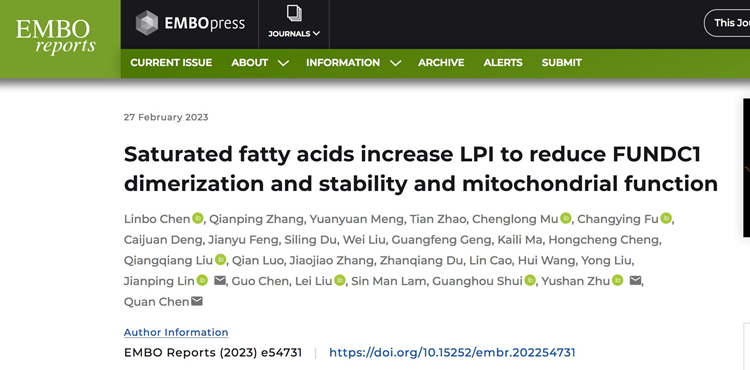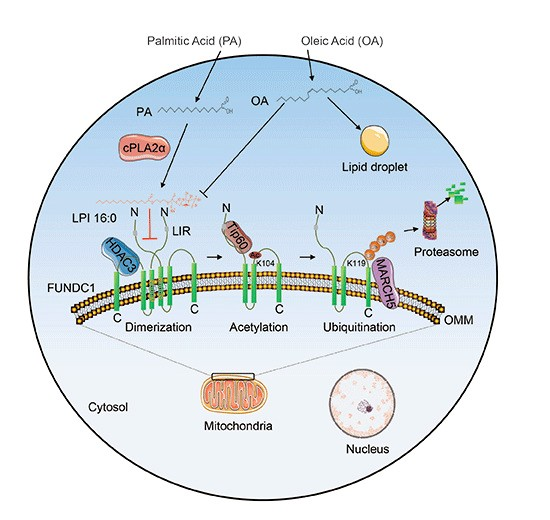NKU Team Discovers a New Mechanism by which Saturated fatty acids increase Lysophosphatidylinositol (LPI) to reduce FUNDC1 dimerization and stability and mitochondrial function
Recently, Professor Yushan Zhu and Professor Quan Chen from the College of Life Sciences of Nankai University, cooperated with Professor Jianping Lin from the College of Pharmacy of Nankai University jointly published a research article entitled “Saturated fatty acids increase LPI to reduce FUNDC1 dimerization and stability and mitochondrial function” on EMBO reports. They found that lysophosphatidylinositol (LPI), an intermediate metabolite in saturated fatty acid metabolism, can mediate the stability of FUNDC1 by disrupting its homodimer structure to regulate mitochondria function.

Excessive dietary uptake of saturated fatty acids (SFAs) causes mitochondrial dysfunction and metabolic disorders, while unsaturated fatty acids (UFAs) counterbalance these detrimental effects. It remains elusive how SFAs and UFAs differentially signal toward mitochondria for mitochondrial performance. They found that saturated dietary fatty acids such as palmitic acid (PA), but not unsaturated oleic acid (OA), increase lysophosphatidylinositol (LPI) production to impact on the stability of the mitophagy receptor FUNDC1 and on mitochondrial quality. Mechanistically, PA shifts FUNDC1 from dimer to monomer via enhanced production of LPI. Monomeric FUNDC1 acetylation orchestrated by HDAC3 and Tip60. Acetylated FUNDC1 can be further ubiquitinated by MARCH5 for proteasomal degradation. Conversely, OA antagonizes PA-induced accumulation of LPI, and FUNDC1 monomerization and degradation. A fructose-, palmitate-, and cholesterol-enriched (FPC) diet also affects FUNDC1 dimerization and promotes its degradation in a non-alcoholic steatohepatitis (NASH) mouse model. This study uncovers a signaling pathway that orchestrates lipid metabolism with mitochondrial quality.

Linbo Chen,Ph.D. student at the College of Life Sciences, Nankai University, is the first author. Professor Yushan Zhu, Quan Chen and Jianping Lin are corresponding authors. Professor Guanghou Shui’s lab from Institute of genetics and developmental biology, Chinese Academy of Sciences performed lipid spectrometry analysis, and Professor Yong Liu’s lab from Xuzhou Medical University helped in Seahorse analysis of mitochondrial function.
Link: https://www.embopress.org/doi/epdf/10.15252/embr.202254731









